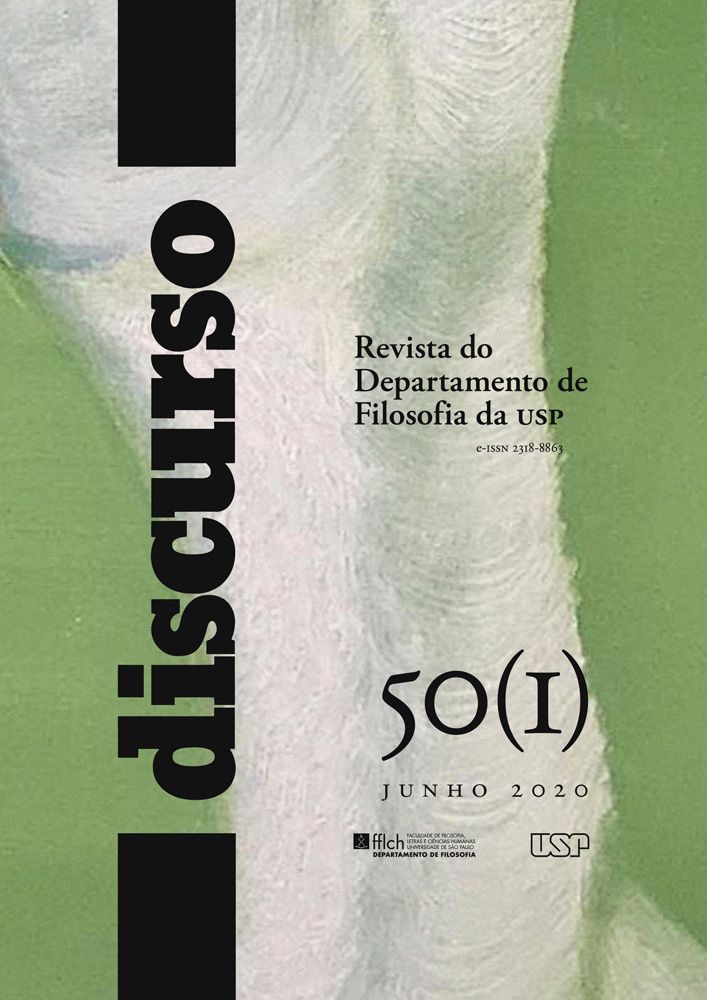Difference and Advantage of the Skeptical Seduction
DOI:
https://doi.org/10.11606/issn.2318-8863.discurso.2020.171563Keywords:
Skepticism, Politics, EthicsAbstract
The essay aims to present the paths of an approach, skeptical of politics and its mechanisms of seduction, as well as its unpredictability.
Downloads
Download data is not yet available.
References
Annas, J. (1983). The Morality of Happiness. Oxford: Oxford University Press.
Aubenque. (1973). “As Filosofias Helenísticas: estoicismo, epicurismo e ceticismo.” In: A Filosofia Pagã. Rio de Janeiro: Zahar.
Barnes, J. (1998). “The Beliefs of a Pyrrhonist.” In: The Original Sceptics: a controversy. Cambridge: Hackett Publishing Company.
Barthes, R. (2003). O Neutro. São Paulo: Martins Fontes.
Bernhard, T. (2011). “Montaigne: uma narrativa”, Serrote (7), pp. 231-238.
Bicca, L. (2012). “Ceticismo como Terapia.” In: Ceticismo e Relativismo. Rio de Janeiro: 7Letras.
Burnyeat, M. (1998). “Can the Sceptic Live his Scepticism?” In: The Original Sceptics: a controversy. Cambridge: Hackett Publishing Company.
Empiricus, S. (2006). Against Ethicists. Cambridge: Harvard University Press.
Laursen, J. C. (2004). “Yes, Skeptics Can Live Their Skepticism and Cope with Tyranny as Well Anyone.” In: Skepticism in Renaissance and Post-Renaissance Thought. New York: Humanity Books.
Smith, P. J. (2007). “Terapia e Vida Comum. ” Sképsis 1(1).
Aubenque. (1973). “As Filosofias Helenísticas: estoicismo, epicurismo e ceticismo.” In: A Filosofia Pagã. Rio de Janeiro: Zahar.
Barnes, J. (1998). “The Beliefs of a Pyrrhonist.” In: The Original Sceptics: a controversy. Cambridge: Hackett Publishing Company.
Barthes, R. (2003). O Neutro. São Paulo: Martins Fontes.
Bernhard, T. (2011). “Montaigne: uma narrativa”, Serrote (7), pp. 231-238.
Bicca, L. (2012). “Ceticismo como Terapia.” In: Ceticismo e Relativismo. Rio de Janeiro: 7Letras.
Burnyeat, M. (1998). “Can the Sceptic Live his Scepticism?” In: The Original Sceptics: a controversy. Cambridge: Hackett Publishing Company.
Empiricus, S. (2006). Against Ethicists. Cambridge: Harvard University Press.
Laursen, J. C. (2004). “Yes, Skeptics Can Live Their Skepticism and Cope with Tyranny as Well Anyone.” In: Skepticism in Renaissance and Post-Renaissance Thought. New York: Humanity Books.
Smith, P. J. (2007). “Terapia e Vida Comum. ” Sképsis 1(1).
Downloads
Published
2020-06-28
Issue
Section
Artigos
License
O trabalho da Discurso foi licenciado com uma Licença Creative Commons Attribution-NonCommercial-ShareAlike 4.0 International.
Os autores aqui publicados mantém os direitos sobre seus artigos
De acordo com os termos seguintes:
-
Atribuição [BY] — Deve-se dar o crédito apropriado, prover um link para a licença e indicar se mudanças foram feitas.
-
NãoComercial [NC] — É proibido o uso deste material para fins comerciais.
-
CompartilhaIgual [SA] — Caso haja remixagem, transformação ou criação a partir do material, é necessário distribuir as suas contribuições sob a mesma licença que o original.
How to Cite
Kiraly, C. (2020). Difference and Advantage of the Skeptical Seduction. Discurso, 50(1), 39–64. https://doi.org/10.11606/issn.2318-8863.discurso.2020.171563




